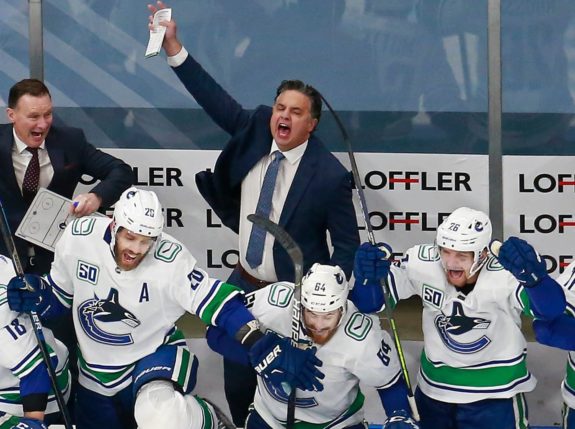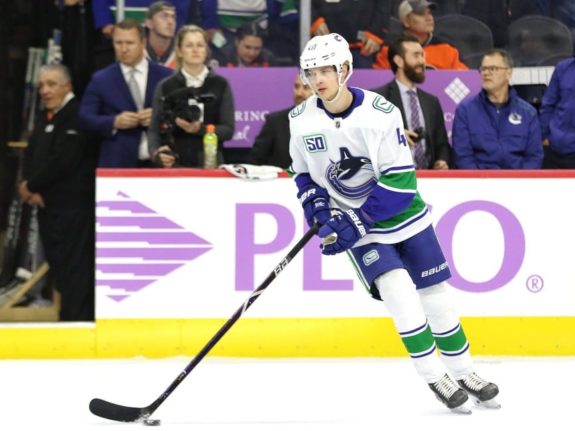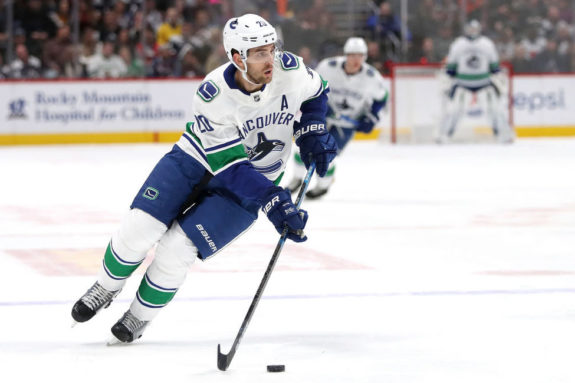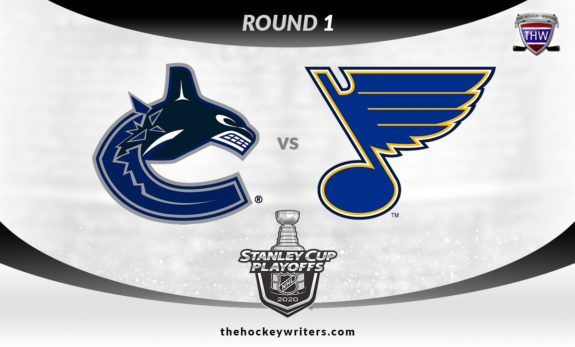After four long seasons of futility, the Vancouver Canucks are finally back in the Stanley Cup playoffs. You can thank Quinn Hughes and Chris Tanev for that. They weren’t the only reason for the team’s success in the qualifying round against the Minnesota Wild, but they were a huge part of it. Hughes was dynamic and of course mature beyond his years as he led the entire team in scoring with six points, which included his first-ever postseason goal. He just continues to amaze, night in and night out, and could be better still, if that’s even possible. Then the elder Tanev, who is not known for putting up offensive numbers, was not far behind with four points.

After the disaster that was Game 1, the Canucks came together as a team, and from the baby-faced kid down to the grizzled vet should all be given full marks for the first series win since Kevin Bieksa shot a fluttering puck from the blue line to send his team to the Stanley Cup Finals. When you compare the 2011 team to this one, there are significant differences as they were a primarily veteran squad, but you can’t help but wonder if this iteration could be in line for something special in this unprecedented round-of-16. There were many signs of greatness in the qualifying series, so let’s take a look at what we learned as we get ready for the first round against the defending champions, St. Louis Blues.
Canucks’ Kids Were More Than Alright
The Canucks came into the postseason with many of their stars lacking experience on the NHL’s biggest stage. It was a legitimate concern going up against the Wild, who boasted players like Eric Staal and Zack Parise, who combined had a total of 163 games of postseason experience. However, after the jitters were shaken out in Game 1, they all seemed to settle into the pressure cooker that is playoff hockey.
Related: Today in Hockey History: Aug. 10
Even though Elias Pettersson only had one goal in the qualifiers, he showed that he could handle himself when the time and space tightened up. He was physical too, which was great to see, as the Wild tried their best to limit his effectiveness. He also displayed the competitive fire and more importantly, the ability to stand up for himself when the going got tough in the corners. I don’t think we will see the “Brad Marchand multiple-punches to the face” without a response from the man they call The Alien.

Bo Horvat, who is the elder of the young guns, took a few games to get going, but he showed up on the score sheet when it mattered the most. With his team down 4-3 and facing the prospect of playing a winner-take-all Game 5, he buried his second goal of the series to tie the game at four. Talk about a clutch performance from the captain. He ended that game with three points, capping off a series in which he led all forwards in ice time and faceoffs taken. He was also the matchup center for most of the series too.
Then there was Brock Boeser, the man who had to deal with trade rumours immediately after he started training camp. The prospect of leaving the Canucks seemed to stoke the proverbial competitive fire as he turned back the clock to his rookie season. Except instead of sniping goals top corner, he was fighting tooth and nail in front of the net banging them in. Basically he showed that he was willing to do anything to score. Along with Hughes, he was probably one of the best players in the series, and he’s only going to get better as the pressure ramps up.
Hughes Has Become One of the NHL’s Top Defencemen
No, that headline is not hyperbole. At a baby-faced 20-years-old, Hughes has become not just the Canucks’ top blueliner, but one of the NHL’s best as well. After struggling a bit to find his stride in Games 1 and 2, he exploded onto the scene in Games 3 and 4. He was fast, he was dynamic, and above all he was productive. You could even say he was the most prominent member of the team in Game 4. Every time he was on the ice, you noticed him making plays and creating chances.
When you dig deeper into the fancy stats, the debate gets even easier to win. He led all Canucks defencemen with a 57.03 Corsi-for Percentage (CF%) and had a very impressive 3.25 expected goals-for (xGF) when he was on the ice. That means he drove play to a very high degree, which is quickly becoming just another day at the office for the University of Michigan alum.
Canucks Veterans Showed Up
The Canucks veterans, even the ones that weren’t expected to, came to play in this series. The high-priced trio of Brandon Sutter, Jay Beagle, and Loui Eriksson all played a major role in the dismantling of the Wild, which is a good sign for the continued success of the Canucks going into the actual first round of the playoffs.
Sutter looked like the player that scored 21 goals for the Pittsburgh Penguins in 2014-15, as he seemed faster and more determined offensively than we have ever seen him as a member of the Canucks. Beagle provided his faceoff prowess and gritty penalty killing from the fourth line and finally, Eriksson did his usual little things well and even had a few forays into the offensive zone. More importantly, he stabilized the second line after Tyler Toffoli went down with an injury in Game 1.

2014 playoff standout Tanner Pearson also had a great series, especially when it mattered the most. He got the party started in Game 2 after his team was shutout in Game 1, then assisted on Horvat’s pivotal tying goal to set the stage for Tanev’s series winner in overtime. After a disaster of a game in Game 1, he gave all he could the rest of the way showing everyone why he was a Stanley Cup champion in 2014.
Canucks Defence Was Not The Weakest Link
At the beginning of the postseason, everyone was worried about the Canucks defence. What was once thought of as the weakest link, has become one of the team’s strengths. Putting aside Tyler Myers’ apparent love for the penalty box, the entire Canucks back end should be commended for the job they did in this series. Alex Edler looked like he was in his prime again, Troy Stecher was steady, Oscar Fantenberg was physical and Tanev was well, Tanev. Even Olli Juolevi got into the act putting together a solid NHL debut in the biggest game of the season.
All in all, the Canucks played good team defence and for the most part limited the Wild’s chances five-on-five to the tune of three goals, which by the way, were all scored in Game 4. It basically took them three games to score a goal at even strength. That’s some pretty good defending from a team that was criticized for giving up way too many high danger chances on Jacob Markstrom. In fact, they only allowed one of those goals in the entire series.
If the defence can remain that stout against the Blues, minus the trips to the penalty box for Myers, the Canucks will be in good shape to move onto the second round for the first time since 2011.
Markstrom Was Good But Needs to be Better
Even though Markstrom put together a solid performance in Game 3 with his first postseason shutout, he did not have the best series overall. We saw too much of the pre-2018 version rather than the Canucks MVP we witnessed in 2019-20. He allowed way too many suspect goals and even treated us to at least two in Game 4 that should not go past any NHL goaltender. For the Canucks to go anywhere in the playoffs, he needs to be better, period.
However, given that he bailed out the Canucks on multiple occasions during the 2019-20 season, we should probably give him the benefit of the doubt. He admitted that he struggled in Game 4, and I’m sure he will be better against the Blues. The success of the team hinges on his ability to be the consistent number one goaltender we saw all season long. If he can’t return to form, it will be an uphill battle to go anywhere past the first round this season.
Bring On the Blues!
After the Dallas Stars won the right to be the third seed in the Western Conference by dispatching the Blues on Sunday, the Canucks will indeed face the defending champs in the first round. They match up pretty well against them when you look at the statistics and the past history between them. They won the season series with a 2-0-1 record, and never looked overwhelmed against the team that surprised everyone by going from basement dwellers to Stanley Cup champions last season.

That all bodes very well for the Canucks going into this series. However, we all know how good the Blues can be. Yes, they struggled in the round-robin, but they have the depth, scoring, and veteran leadership to give the boys in blue and green fits in the defensive zone. That being said, the Canucks also have proven to be a very resilient team capable of scoring and defending too. If the team comes together, as they did against the Wild, they have a very good chance of winning this series. All I know is that it’s exciting to finally talk playoff hockey again in Vancouver. So let’s bring on the Blues and hopefully Laura Branigan’s Gloria! isn’t played too often in the coming weeks.